At a glance
- The GTA’s rent prices bounce back after four month-to-month declines – The average monthly rent price for an unfurnished, one-bedroom unit in Toronto is now $2,324 this February, a $55 increase from January. Despite this, the region’s rates now sit just below where they were in November, and are now up +8.19% from February 2023, compared to a +17.46% year-over-year change between September 2022 and September 2023.
- Markham has the region’s fastest-growing rent prices – Markham saw a +16.90% year-over-year increase in the city’s rates for 1br unfurnished units. The city also tied with Kitchener for the highest year-over-year population growth, with a +10% growth.
- Canada’s rapidly rising rent prices showing signs of slowing – Across the country, rental rates grew less between Feb. 2022 to Feb. 2023 than between Feb. 2023 to Feb. 2024. Several legislative changes are expected to compound this throughout the year, including a significant decrease in the number of approved study permits, and new rules for short-term rentals in B.C.
Looking for our full February 2024 Toronto Rent Report? Download your copy here to get all the latest insights, including a detailed breakdown by neighbourhood.
Average monthly rent prices in Toronto have increased this month, following four consecutive month-to-month declines. As of February 2024, the city of Toronto’s average monthly rent price for an unfurnished, one-bedroom unit stands at $2,324, a $55 increase since January. In an announcement on January 24th, the Bank of Canada once again held the country’s interest rates at their current levels of 5.00%, which could play a part in stabilizing rental rates this year.
We’ve recently published our 2024 Canada Rental Market Trend Report with in-depth analysis of average rent prices, driving factors, and predictions for the year ahead. You can download your copy here.
Let’s take a look now at the latest data and see which neighbourhoods are experiencing the biggest changes in furnished and unfurnished rental rates.
Download The Latest Toronto Rent Report
For the complete Toronto rent report, download here.
Toronto rent trends
Average rent prices for unfurnished, one-bedroom units in Toronto have increased this February after four straight month-to-month declines this winter. Looking at a year-over-year comparison, the average monthly rent for an unfurnished, one-bedroom unit in the GTA has increased by $176 since February 2023.
Planning on raising rent this year? Ontario’s Annual allowable rent increase limit for 2024 is 2.5%. Find out when and how you can increase rent and ensure you’re complying with provincial guidelines by reading our updated Guide to Ontario Rent Increases.
>> Recommended Reading: What is Ontario’s maximum allowable rent increase?
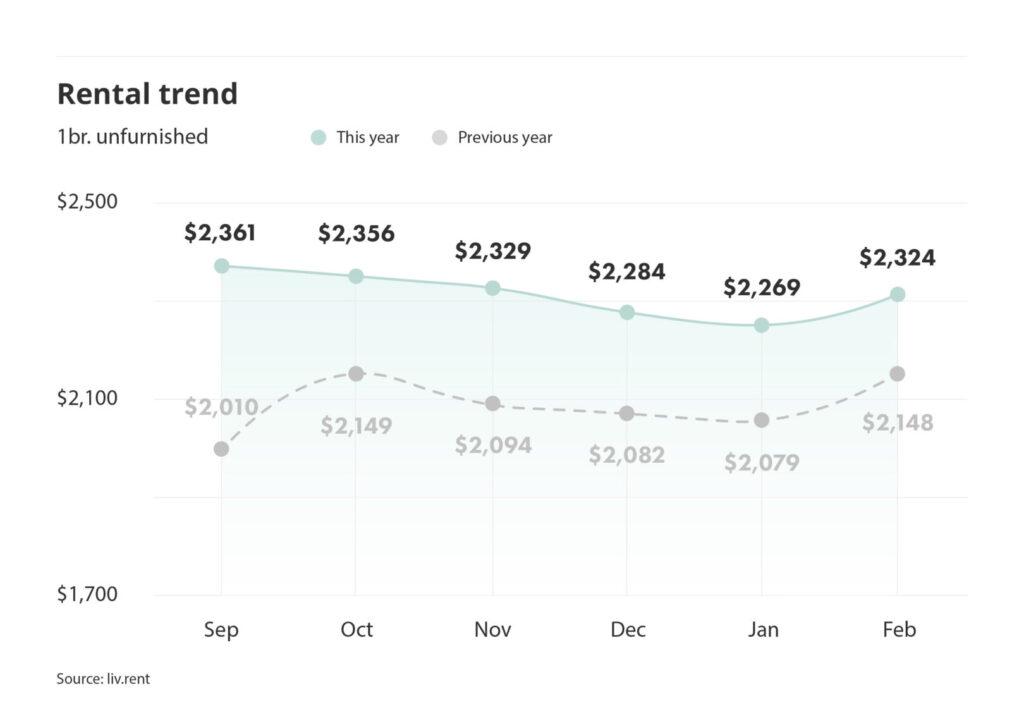
Is your rental priced competitively?
Find out with a free rent estimate. Our team of rental experts will calculate your unit’s true value based on your listing details & current market trends.
Month-to-month rent change
This chart breaks down the percentage change in rent prices across all GTA cities/municipalities between January 2024 and February 2024.
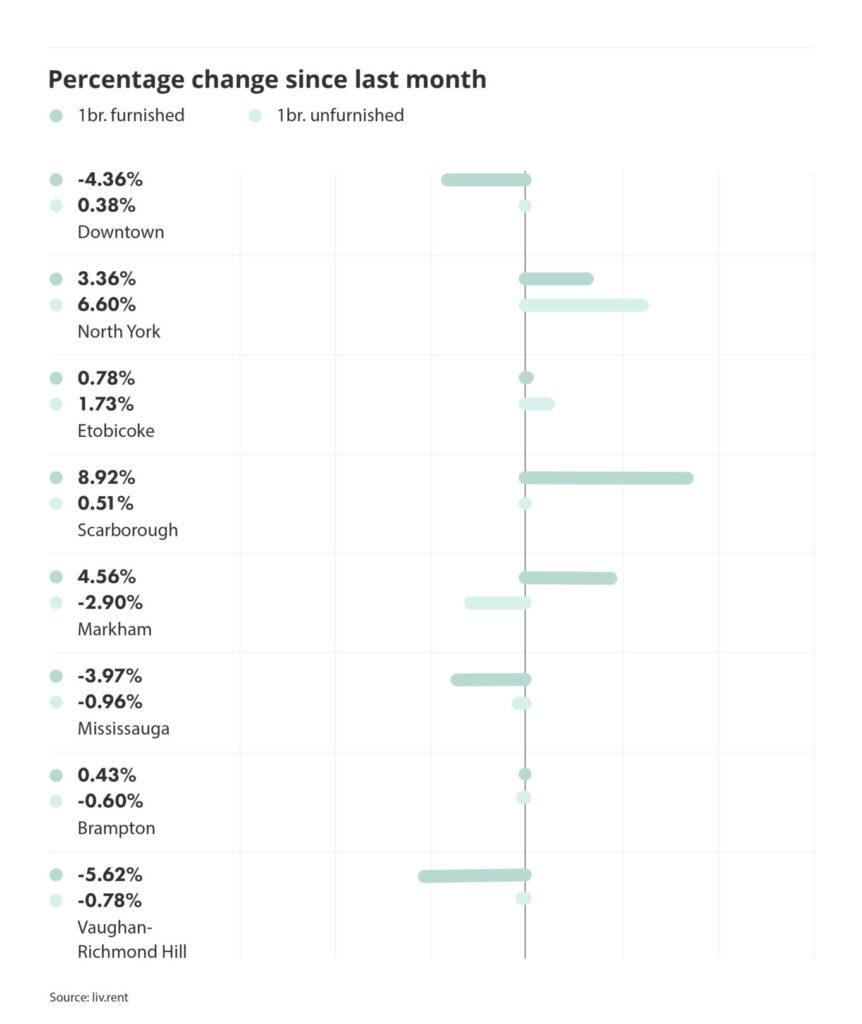
Unfurnished Toronto rent trends
Average rates for unfurnished, one-bedroom units in the GTA were fairly stable this month with a few noteworthy changes. This month, the most significant month-to-month increase was seen in North York (+6.60%), with smaller increases in Etobicoke (+1.73%), Scarborough (+0.51%), and Downtown Toronto (+0.38%). Markham (-2.90%) had the most notable month-to-month decrease, with rates also falling in Mississauga (-0.96%), Vaughan-Richmond Hill (-0.78%), and Brampton (-0.60%).
Furnished Toronto rent trends
Looking at furnished units, the largest month-to-month increases were in Scarborough (+8.92%) and Markham (+4.56%), while the most significant month-to-month decreases occurred in Vaughan-Richmond Hill (-5.62%) and Downtown Toronto (-4.36%).
Toronto furnished vs unfurnished averages
This February, prices for both furnished and unfurnished one-bedroom units rose. This month, the average one-bedroom, furnished unit rents for $11 less than a one-bedroom unfurnished unit. This means that, at least during the slower winter renting season, landlords are unlikely to see significantly higher profits renting out their units furnished – although there is still some demand for short-term rentals.
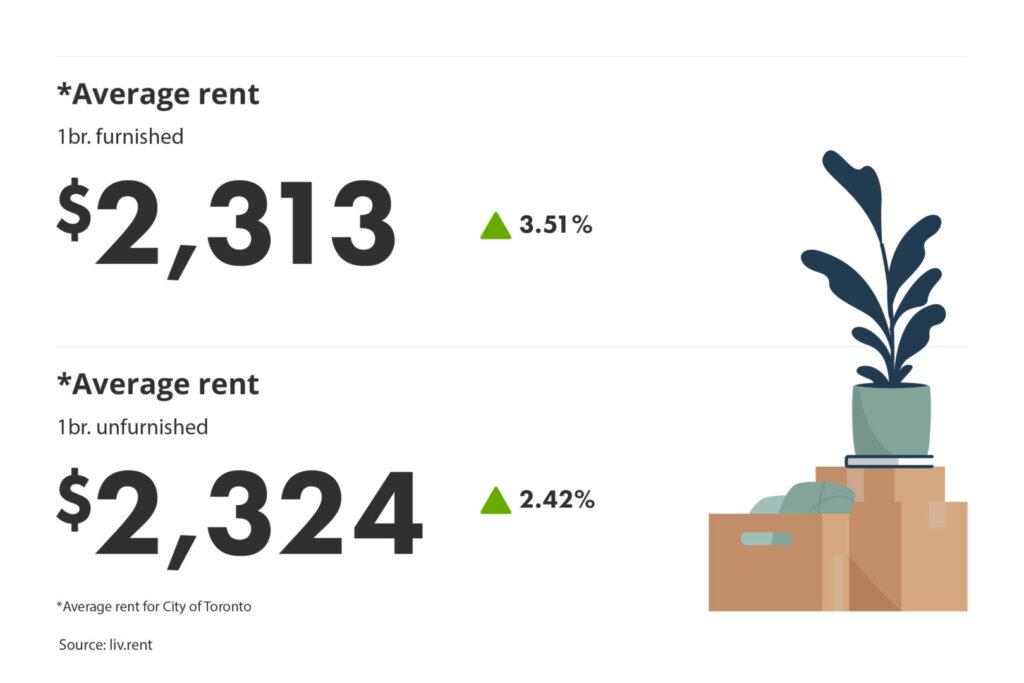
Rent per square foot
Our monthly Rent Reports also look more closely at the average rent per square foot in municipalities throughout the Greater Toronto Area. This February, North York ($3.89/sq. ft.) has the most expensive rent in terms of cost per square foot, while Downtown Toronto ($3.84/sq. ft.) has a similarly high cost for space. This month, the least expensive rent per square foot can be found in Brampton ($2.03/sq. ft.).
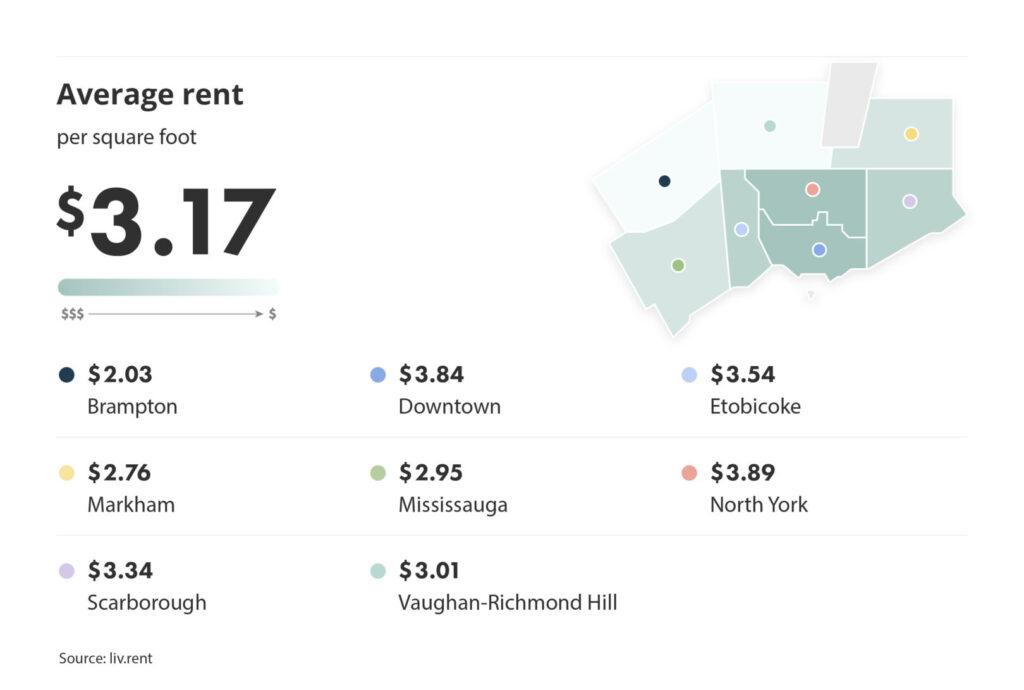
Active listing data
We’ll also be looking at detailed statistics for currently active listings available on the market to see which property types and number of bedrooms are the most represented. For renters, these numbers show which types of units you’re most likely to encounter in the Greater Toronto Area, while for landlords, you can assess how much competition you’ll face based on the current supply.
Active listings by property type
As of February 2024, the most common rental property type in the Greater Toronto Area was apartments, representing the majority of all listings in the GTA at 82.62%. Partial Houses (e.g. basement suites) were the second-most rented unit type this month, representing 10.37% of active listings.
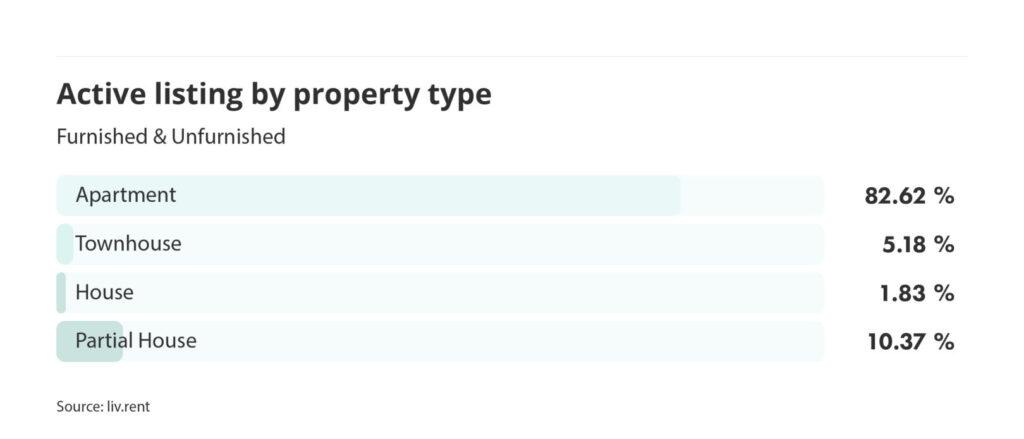
Active listings by number of bedrooms
In terms of the number of bedrooms, we saw a much more even spread across active listings on the market this February. One-bedroom units were the most common type of listing in the GTA this month at 61.69%, while two-bedroom units represented 26.77% of the region’s active listings.
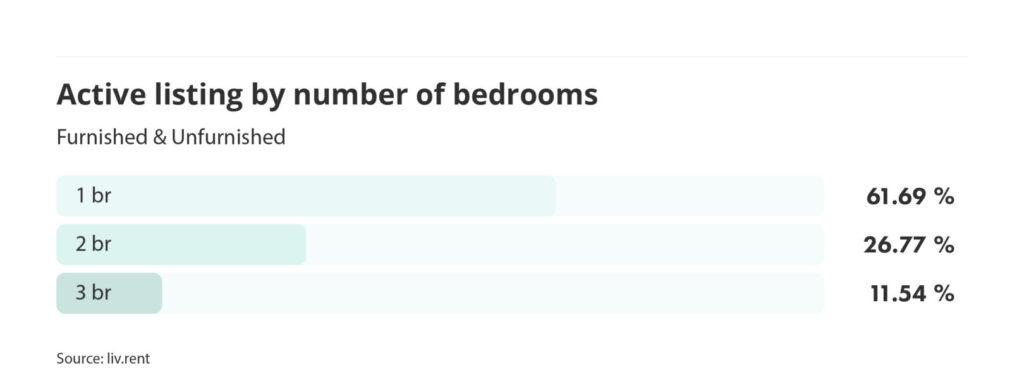
City breakdown
This February, Oshawa is the cheapest municipality to rent in out of the areas we look at for our Rent Reports, while North York is the region’s most expensive place to rent this month.
The average rent price for an unfurnished one-bedroom unit in Oshawa currently stands at $1,718, while in North York, the same type of unit rents for an average of $2,472 – a difference of $754.
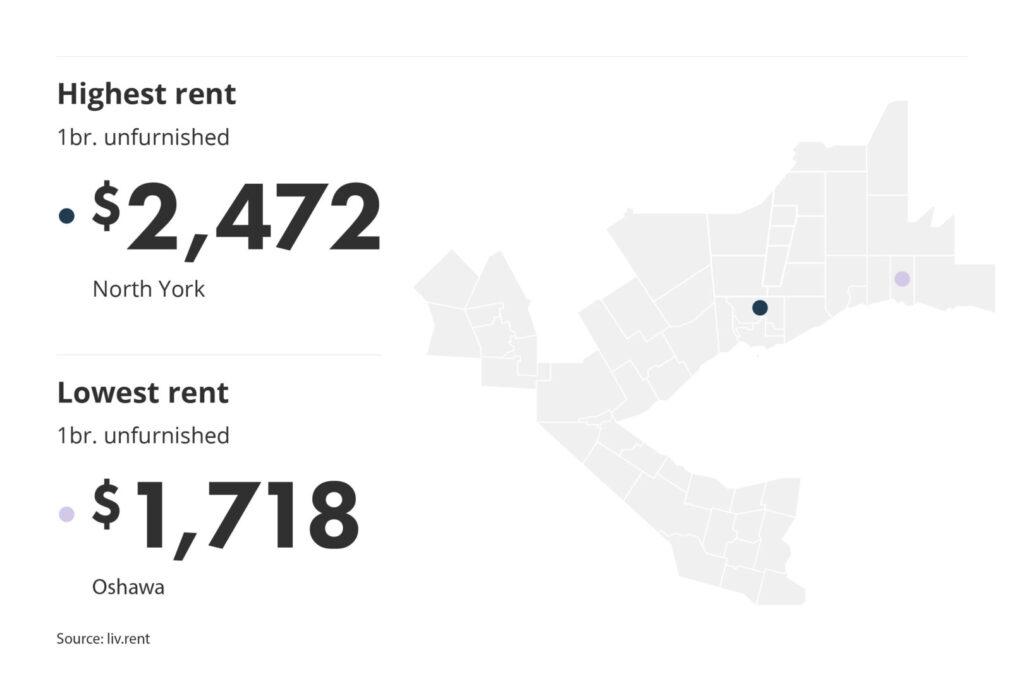
Read More: Rental Vacancy Rates In The City Of Toronto
Because Ontario’s different communities are so diverse, we’re breaking down the GTA into its different cities and municipalities to see the price difference within listing types: one-bedroom, two-bedroom, and three-bedroom units, both unfurnished and furnished.
- Downtown Toronto had the highest average rent prices for two- and three-bedroom unfurnished units, as well as all types of furnished units.
- Prices increased for one-, two-, and three-bedroom unfurnished units in Downtown Toronto.
- Out of these cities, Brampton had the lowest average prices for one-, two-, and three-bedroom furnished & unfurnished units.
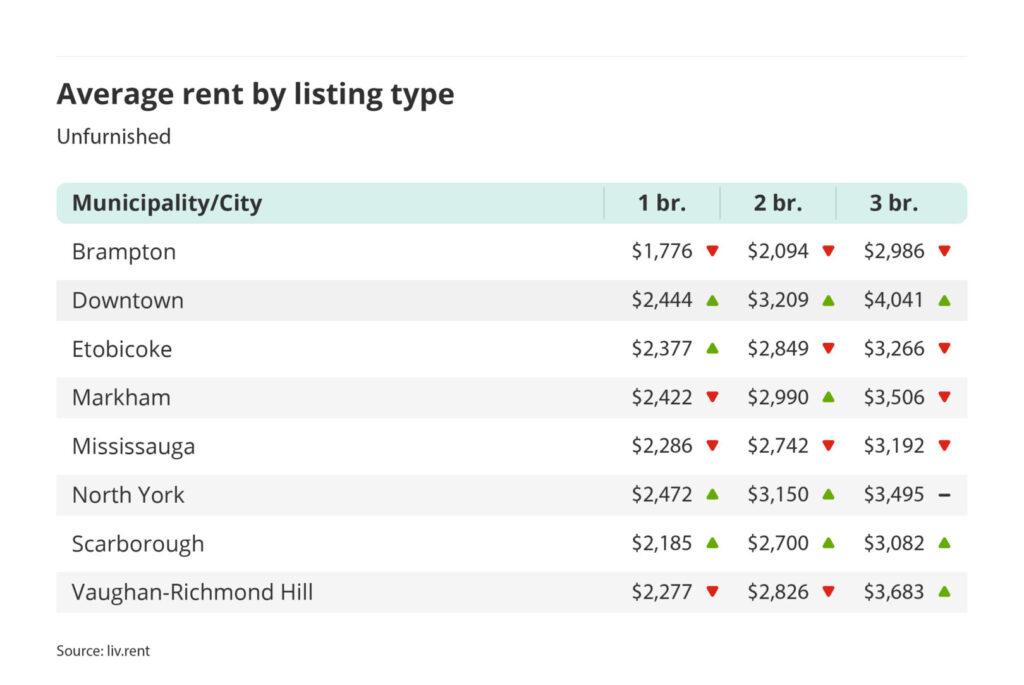
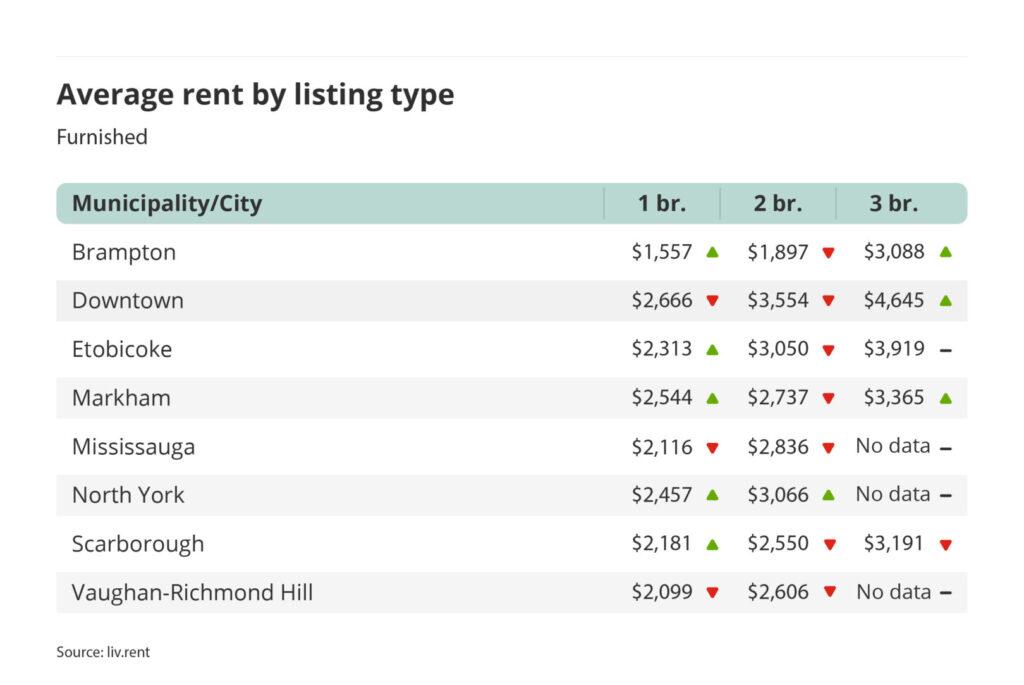
Rental averages for other Ontario cities
We’ve also explored data from cities and municipalities in other regions within and surrounding the GTA. Looking at these additional cities, St. Catharines is the least expensive to rent in this February at $1,586/month for an unfurnished, one-bedroom unit, while North York is the most expensive, at an average of $2,472 this month.
For complete data on these cities as well as other municipalities outside of the Greater Toronto Area, download our full report here to view the complete report.
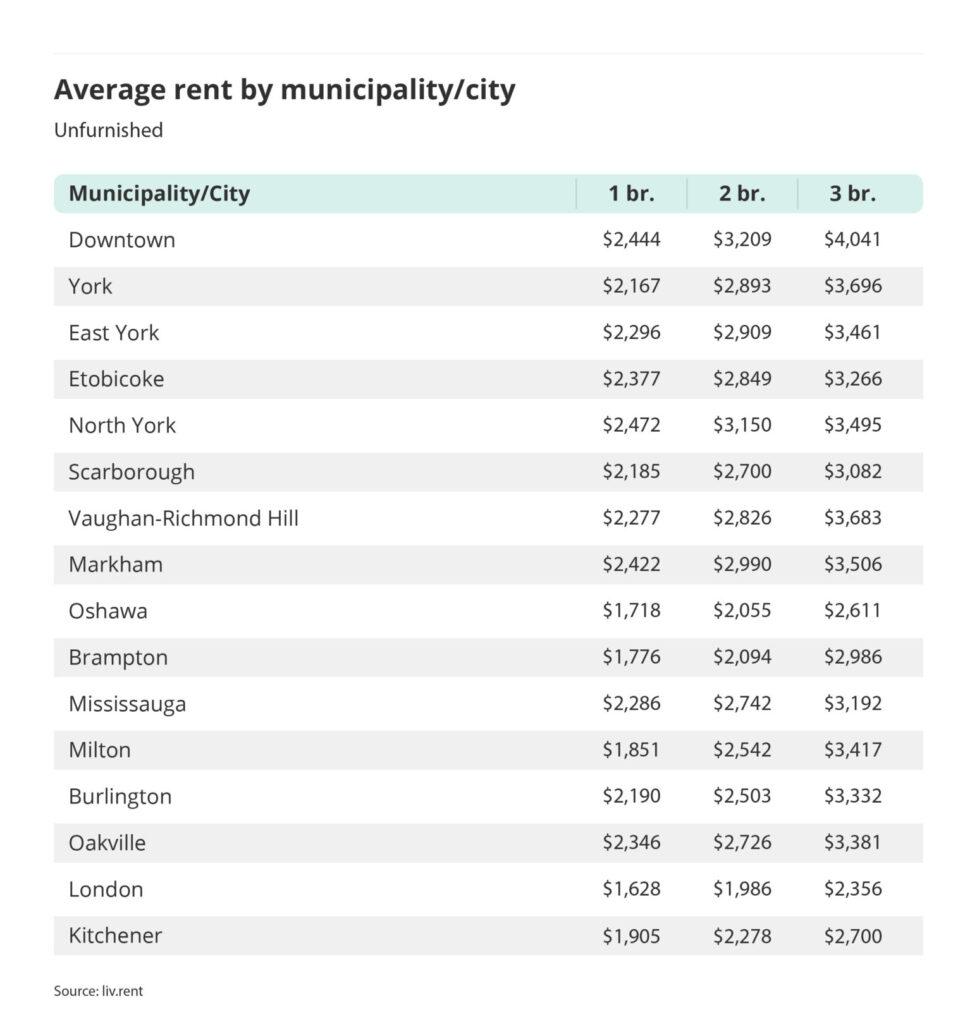
Is your rental priced competitively?
Find out with a free rent estimate. Our team of rental experts will calculate your unit’s true value based on your listing details & current market trends.
Downloadable resources
Our complete February 2024 Rent Report has information on even more key areas, broken down into region and unit type for a complete overview of rental averages in Ontario. To view these and all the other new information we’ve added, be sure to download your copy of the Rent Report below.
Download The Latest Toronto Rent Report
For the complete Toronto rent report, download here.
Renting in Ontario
For more information on renting in Ontario, refer to these comprehensive resource posts:
- What’s A Standard Rental Application?
- What do you need when applying for a rental?
- What Can A Landlord Ask For On A Rental Application In Ontario?
- How Do I Fill Out A Rental Application?
- Ontario Standard Lease Explained
- Frequently Asked Questions: Everything You Need to Know About Eviction in Ontario
Data collection methodology
Our monthly rent reports use data from our own liv.rent listings, as well as data our team manually collects from other popular listing sites – looking at available basement suites, apartments, condos, townhouses, semi-detached houses, and single-detached houses for each area.
When collecting this data, we do exclude luxury properties listed at over $5,000, as well as rooms for rent and shared accommodation. Investing in manual data collection means that we only consider the current month’s listing, since we can filter out duplicate listings and older ads that haven’t been removed.
Another key difference between our data collection methods and some government agencies like the CMHC is that we only include current asking rent prices. Many official reports will include data for entire buildings in their reports, which tends to skew numbers lower since many units are already occupied, and may be rent-controlled or rented for significantly lower than the current rates.
As we are a Canadian rental platform founded and based in Vancouver, we want to ensure that we’re providing a completely accurate depiction of the rental market in the cities we look at.

Rethink The Way You Rent
Not on liv.rent yet? Experience the ease of digital applications & contracts, verified tenants & landlords, virtual tours and more – all on one platform. Sign up for free or download the app.
Subscribe to receive these monthly updates on the Vancouver rental market. Discover last month’s Rent Reports below:
January 2024 Metro Vancouver Rent Report
January 2024 Toronto Rent Report
January 2024 Calgary & Edmonton Rent Report
January 2024 Montreal Rent Report

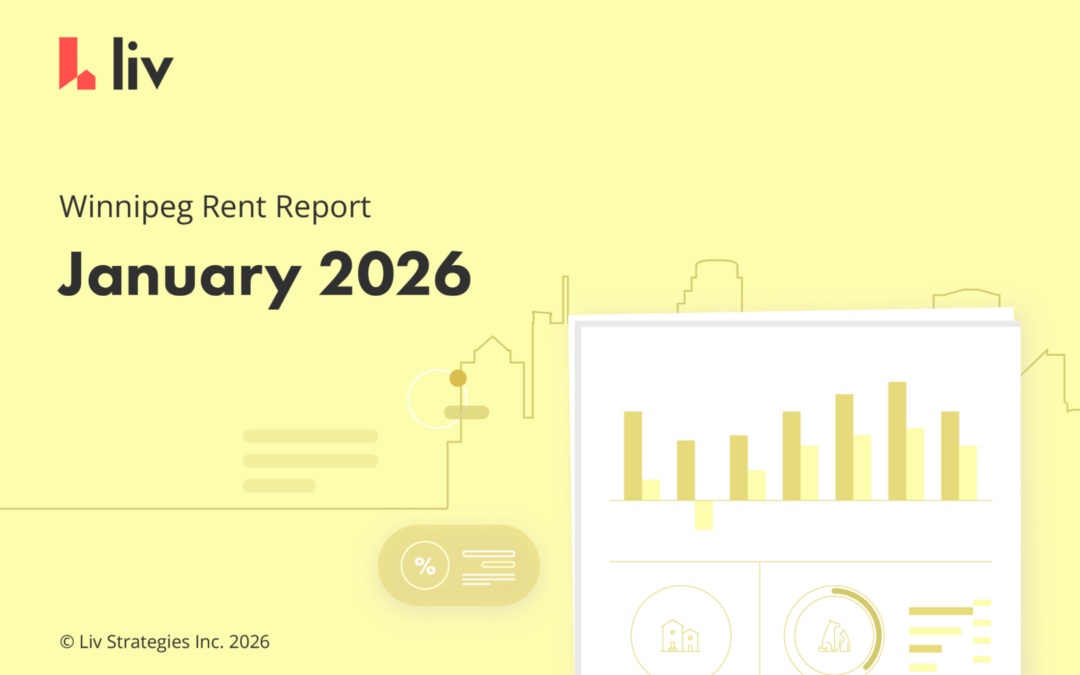
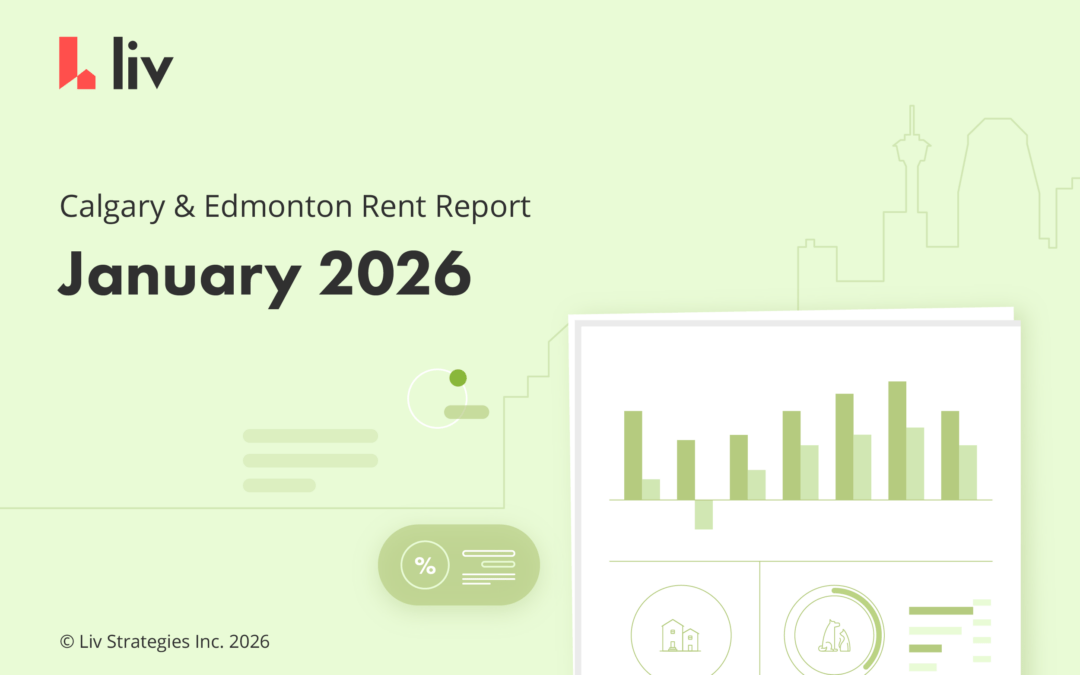
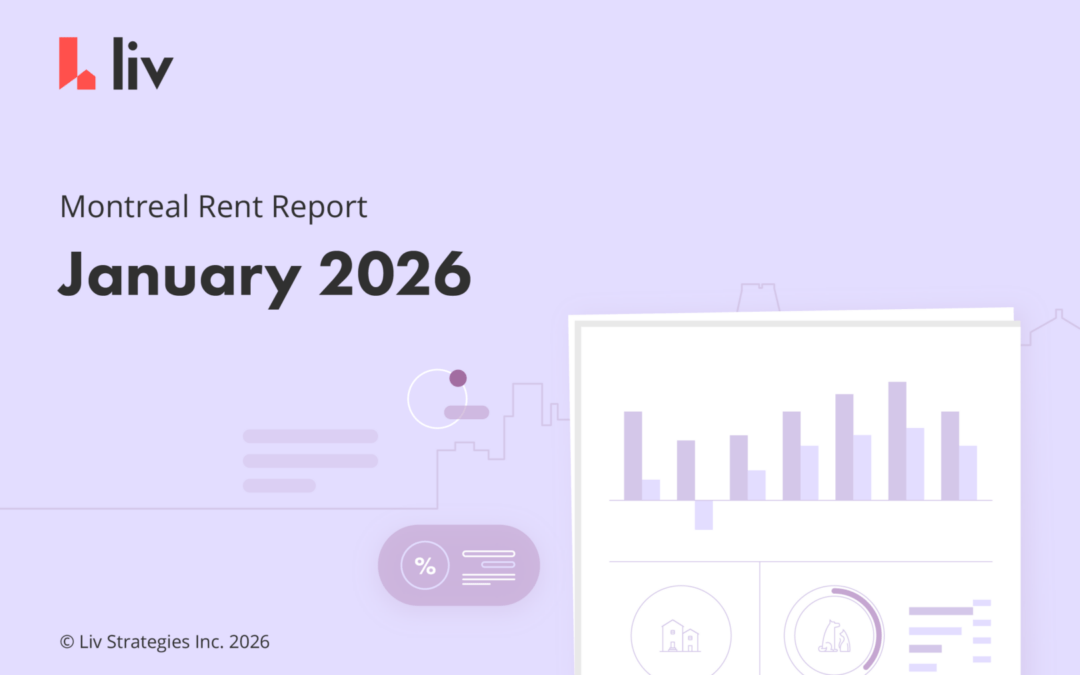
0 Comments